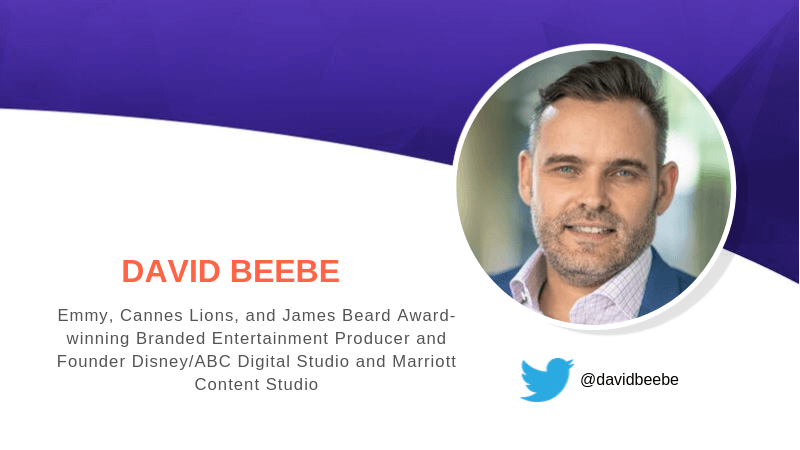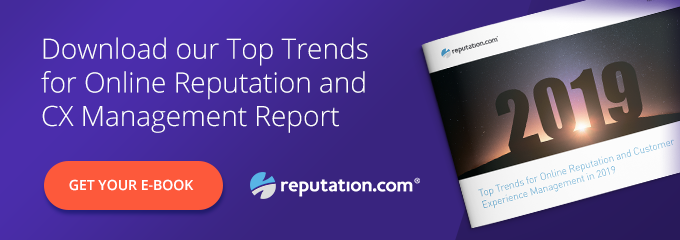Q&A with David Beebe re: Branded Content and Digital Marketing Strategy
Reputation Staff Writer


David Beebe is an expert in creative content, brand marketing and storytelling. He founded the Marriott Content Studio and the digital content studio at Disney/ABC. Beebe won an Emmy for outstanding creative achievement in interactive media as well as Cannes Lion and James Beard Awards. Beebe talked to Reputation.com about how brands can tell their own stories to gain marketing traction and how to build your reputation.
How did storytelling in marketing come about, and why is it so successful?
If you look at how producers and traditional media storytellers are trained, they focus on the audience wants. It’s reflected in the programming. The content is being produced for an audience as entertainment value. Today’s world of marketing is very much the same.
To build that relationship, brands have to provide value through entertainment — information to drive a sell. That’s where those two worlds intersect: brand marketing and Hollywood storytelling. It’s not what we want to say or create.
Sponsors interrupt a story with their ad, their product. In the past five years, brands started to ask, “Why am I not the one producing the story and paying for it myself and flipping the model on its head?” Rather than interrupting, they became presenters.
Once you own the story, you can start transforming marketing from a cost center to a revenue center. Now you own the distribution rights and can license that content to others and get money back from it, and that goes back into funding more marketing.
One example is Lego films. It’s a franchise. It’s produced with a brand involved. It’s not an integration. They own it and participate in the profits. They’re a presenter. It’s around the audience they attract and with whom ultimately want to engage.
Can this work for small companies too?
It’s typically larger brands, but it doesn’t mean smaller brands can’t do it as well on a smaller scale. The consumer appreciates that the brand is trying to give them information without trying to sell something right away.
Whether it’s traditional marketing, content marketing or premium content, it doesn’t take a lot of money to do the simplest thing, which is brand journalism. I’ve done projects as small as $100,000. Larger brands are closer to $3 million for a full film, location, actors and crew, etc.
How about industries that don’t involve toys or other exciting products? Can they tell stories too?
Certain industries are easier.
Everyone’s fighting for attention. It’s easier for a travel company than a bank. But banking is very personal because it has to do with finance. That physical space that people are coming into gives you a platform. Why not create a space that is fun, entertaining, interesting?
When you consider how to manage a company’s online reputation, is it different for big companies and small companies?
It’s very different for the type and size of business.
Engaging shows you care about your brand and your reputation. It goes for a single, small business as well as doctors and lawyers. It tells someone that you care about your business and the customers. I think that’s huge.
People want to see that you’re human — that comes through online — and that you care. Bigger brands can screw up just as quickly — if not more quickly — than a small brand because there are more eyes on them.
How much time do you think businesses should put into managing their online reputations?
We live in this “always-on” world. Consumers expect us to be on as well. Especially if you’re in an always-on business like travel. This isn’t something you check weekly. You need to be there. There’s a ton of opportunity to engage in real time to grow your brand and reputation.
You have to constantly build that reputation online through blog posts, by being active in conversations, by attending events, doing interviews, being out there, talking about the work and providing that value.
On an individual level, if something goes sideways from your personal brand, that’s something that requires specialized service. One of the things that people miss is that they need to have that continual monitoring. They need to be there. It’s not once a month or once a week; marketing is 24/7. If you’re not there, your competitor will be. If you can’t do it, get someone to do it for you.
So you have to respond, but what if you do it wrong? Is that worse than not responding at all?
It takes a second, one wrong response, one wrong message to destroy a reputation.
I’ve seen it happen. I’ve seen businesspeople get angry. It’s really hard — they take it personally, as an attack. They respond and defend. But you can do it in a professional way. People want to see that you’re listening, participating in a dialog. There’s a right way and a wrong way to say, “I hear you.”
The best thing to do is to take it offline. Tell them you hear them, ask them to send you their information and take it offline so the conversation can happen there. This is how the airlines do it.
What helps a reputation more than anything else?
If someone comes to your place of business and has a bad experience with the first person they meet, that kills all the work you’ve put into your reputation and all the marketing.
A lot of work has to go into training. Marketing is one thing, but the actual brand experience is something else.
Every person in the industry should be trained as a storyteller-in-residence. Part of their job is to understand not just context, but empathy. They should know how to extract stories from people. They need to know how to have a conversation and really build that relationship. People are the biggest asset for brands, and management spends no time training them. They just give them a manual.
If you’re a new business starting from zero, what’s the best way to get started with marketing?
People ask me, “How do I start? I don’t have a lot of money.” You just have to do it, no matter how small your effort. Take baby steps. Don’t get so focused on the goal that’s three or six months or a year away.
The most important thing is your brand narrative. That’s one of the hardest things for people to do: define the narrative.
Next, find out how you’re going to measure it and what your goals are. What does ROI mean to you?
As marketers, we become obsessed with the sale. Maybe how you’re going to measure it is based on brand awareness. Maybe it’s changing the perception of your brand. Maybe it’s about sales. Maybe it’s about all those things. How are you going to measure success?
If you don’t know that, you don’t know if it worked when you’re finished.
______________________________________________________________
Reputation.com helps companies improve their online brands and increase positive customer feedback.Download our top trends for online reputation and CX management report today.

